- Home
- Laura Thalassa
Famine (The Four Horsemen Book 3) Page 37
Famine (The Four Horsemen Book 3) Read online
Page 37
“I think you’re confusing my wonderful personality with your own,” I reply.
The horseman laughs at that. “Hmmm, maybe.”
Then he leans in and kisses me. It’s short and sweet and all too brief.
The horseman pulls away just enough to lean his head against mine.
“I’ve never felt so alive before, Ana,” he admits. “It’s wonderfully messy. I think I might like being human after all.”
Two nights later, I find myself on my back, Famine’s head between my thighs, my fingers wrapped up in his hair.
Since the two of us started living together, I’ve discovered something about Famine: he loves going down on me. Loves, loves, loves it. Which, I’ll be honest, I have mixed feelings about.
Obviously it feels good, but I’m also so self-conscious. It’s more than just feeling like my vagina has seen some shit, and I don’t want his mouth down there. It’s also that I am unused to selfishly receiving pleasure.
I think that might be part of the reason the Reaper likes this so much. I’m pretty sure he’s determined to replace my old conditioning with something new.
He pauses now, his face moving away from my core.
I’m panting, still staring up at the tree branches above our bed, when he shifts himself, draping his naked body over mine, his erection pressing against my thigh.
He stares down at me.
“Marry me,” he whispers.
I freeze, taking in his features. His eyes are bright and he looks eager and hopeful, his normal arrogance wiped clean from his expression.
“Please,” he adds.
My heart lurches.
I think this is him groveling.
My throat constricts, and my pulse is speeding up. “Why do you want to marry me?” I ask. I find that I’m actually afraid of his answer.
The Reaper’s lips quirk. “Little flower, don’t you know? I happen to enjoy it when you pee on my boots, and you sing songs off-key, and when I wake up to your atrocious morning breath—you know, you also fart in your sleep.”
Jesus.
“This is the worst proposal I have literally ever heard,” I say.
“I like it when you heckle me for saving small creatures, and I want to keep growing plants inside this house just so that you’ll give me shit for it. I happen to love you—all of you—and I always will. And I want you to always love me too.”
“You know I do,” I say quietly.
“Marry me,” he says again.
My heart is pounding way too loudly. “Marriage is for humans,” I say.
“I don’t give a damn. I want you to be mine under the eyes of all of these deceitful little assholes we live alongside.
“Please,” he repeats.
Still I hesitate.
“I’m afraid,” I admit. Afraid of loving something this much, of having it this good. I’m afraid of actually getting everything I’ve ever dreamed of because I’ve never gotten anything of substance before in my life.
“No one will ever hurt you again,” Famine vows, misinterpreting my words. “It’s us against the world, Ana. Marry me.”
A moment later he reaches under the mattress and pulls out a ring. Sitting right in the middle of it is a fat-ass diamond. The thing isn’t some modest stone, this thing is a goddamn boulder.
My gaze moves to his. “Who did you kill to get that thing?”
“Ana,” he says, his voice beseeching me to take this seriously.
This is too good to be true, but for once, I don’t let that stop me.
I smile up at Famine, my grin so wide it hurts my cheeks. I tuck a lock of his toffee-colored hair behind his ear, and then I lean up and kiss him.
“Yes,” I say against his lips. “Yes.”
Chapter 50
Famine
The days become weeks, the weeks become months. My scythe doesn’t rust and my muscles don’t grow soft, but I have gone to seed, my purpose set aside.
Just for a moment, I told myself when we settled in. Then I will get back to my task.
I knew I was telling myself a lie, but it was alright at the time. I wanted to give Ana a respite; she asks for so little.
But the truth is, I actually like this derelict little house of ours, and I’m curious just how overgrown I can make it before Ana actually loses it.
I expected the townspeople to plot against me, to rebel and fight for their lives. I was ready for that confrontation. But while I sense their deep and abiding fear, they have left me alone. I even get the impression that they respect me.
Ana, on the other hand, is openly adored. The same people who cast me fearful glances will happily pull her aside to chat about this or that. I would die before I admit it, but a part of me is proud of how beloved my fiancée is.
And now I’ve come to the ridiculous decision that maybe I’ll hold off killing them altogether—at least while Ana lives. Only then will I resume ravaging these lands.
My throat closes up at the thought of Ana one day dying.
What will happen when that day comes? Once she’s given me children—assuming, of course, that she ever wants them—and she grows old and passes. She’ll be gone, and … and … I will be forced to feel the earth take her body back into itself. I will feel it pick her apart and disperse that beloved skin and that beautiful hair and every other bit of her into the ground, food for some other, newer life. The world will go on, I will go on, even if she won’t.
I find I can’t breathe at the thought. It cuts too deep. Much, much too deep.
Why have I never considered this?
It’s not even her dying that causes me grief; it’s the lingering on without her. Lingering on and on.
I stand out in our yard, taking in my surroundings with a sort of helpless fear I’ve come to despise. I can hear Ana somewhere in the house, humming while she burns the dish she’s trying to make.
I still can’t get enough air in my lungs.
How will I ever possibly take back up my scythe once she’s gone?
I won’t.
I can’t.
It’s as simple as that.
What a fool I’ve been to believe I didn’t have to choose between Ana and my task. Choosing her was the end of my task. There’s no moving on once she’s gone.
But—if I’m made mortal—I’ll age with her, die with her, move on to whatever comes next with her.
I want that. I want it bad.
But mortality would mean living in this body I have long despised, a body I’ve only recently been reconsidering. And it would mean giving up my powers.
That’s a staggering tithe—one my brothers have already paid.
I finally understand why they traded in their weapons and their immortality. There is nothing quite like being human. This damnable, deranged experience actually has some perks.
I find I don’t care nearly enough about my power to shake away this notion that I could be mortal with Ana.
I want to do it. Right now. Before I lose my nerve and retreat back into my usual, apathetic self.
However, there is one more thing that stands in my way, one other thing that’s always stood in my way.
Forgiveness.
The word rings in my ears like God Herself spoke it.
Forgiveness.
I suck in a sharp breath. Ever since I first heard Ana speak that word in her sleep, a word her vocal chords shouldn’t have even been able to produce—it’s been there, taunting me.
I’m not sure who I’m supposed to forgive, but I imagine it’s everyone. God would expect no less.
It’s not even in my nature to forgive. I’m apathetic at best, vengeful at worst. And after everything humans have done to me, to Ana …
Forgiveness is preposterous.
I don’t need to do it. Not today, not ever. I still get to have Ana.
Ana, who every second is losing bits of her life, the clock counting down to her end.
My steady pulse grows frantic.
I don’t
need to decide today.
I don’t.
But the longer I wait, the closer to death she’ll get. Is it wrong that I want to age with her?
Forgiveness. I turn the word over and over in my mind. Forgive these petty, wicked creatures.
It’s so wholly oppositional to what I’ve been doing this entire time.
Above me, storm clouds gather, the thick plumes of them darkening the sky. The ground is beginning to shake—just a little.
I think of Ana. Ana, who asks nothing of me. Ana who saved me before she knew what I was—and then saved me again once she did know.
Ana, who I forgave long ago—I forgave her the very night we met. And I’ve forgiven her every day since—for harming me, for hating me, for every slight she’s inflicted. It’s easy enough to forgive someone like Ana, who is kind when she doesn’t need to be. Ana who is radiant and thaws my cold heart.
It’s much harder to forgive everyone else, especially when everyone else includes the people who once hurt me.
They made ribbons of my skin, they disemboweled me, they stabbed me—over and over—and burned me alive. Those men and women made pain an art form.
And the very night Ana saved me, my body still mutilated, God forced me to consider that damnable word.
Forgiveness.
You ask too much, I’d whispered into the darkness, my voice broken. Far too much.
I hadn’t been able to forgive this teeming mass of humanity then. I still haven’t been able to do it. But I know intuitively that I don’t get mortality until I do this.
I swallow.
A raindrop hits me. Then another. The ground beneath me is shaking.
If I forgive humanity, then what?
I think of these wretched people, with their crudely-dug wells and their rickety corrals full of bored looking animals. I think of the crumbling cities overgrown with plants.
Human hearts are spiteful and selfish; they are what bid me and my brothers here.
As though aware of my thoughts, my armor materializes on my body, and my scythe and scales appear a mere arm’s span away from me.
I feel the weight of not just my armor, but my hate and anger, my task and my immortality—all of it—on my shoulders.
I drop to a knee and place a fist against the trembling ground, even as raindrops begin to patter against my armor, coming down faster and faster. My breath is labored and my ever steady heart is quickening.
Something’s happening to me. I don’t know if it’s as simple as my mind changing, or if the forces that brought me here, the forces that made me a man and forged my purpose into form are now transforming.
“Famine?”
I jolt at the sound of Ana’s voice.
My gaze flicks up from the ground, where small plants have started to flower and twist up my wrist.
She stands outside our doorway, her cotton dress whipping in the wind. Rain is pelting her, and her eyes look spooked.
Still, she’s so goddamn radiant that it makes my chest tight looking at her.
At what point did she become my purpose?
Her gaze roves over me. “What are you doing?” she calls out to me.
I don’t … I think …
Fuck, I’m uncertain. I hate being uncertain.
Forgiveness.
That bloody word echoes through me.
“I’m … relinquishing my purpose.”
Chapter 51
Ana
Famine has barely spoken the words when—
BOOM!
It sounds like the world is cracking itself wide open.
I stagger towards the horseman, the ground trying to throw me off like a wild horse bucking its rider.
Another earthquake.
I remember the last one well enough. Famine had caused it then, too.
Around us, the earth heaves, and trees from the forest that now surrounds our house snap by the dozens, their trunks crashing to the ground. That’s the only sound I can pick out, but there are others too—too many others. I think our house is making some of them.
Rain turns to hail and lightning flashes from the heavens—coming so fast and from so many places that I can’t make sense of it.
I cover my head as a bloodcurdling howl rises from the depths of the earth, the sound filling the sky, so deafening that it drowns out the roar of the storm.
Far in the distance, several of Taubaté’s derelict skyscrapers begin to fall.
I swallow my scream at the sight. They crumble apart as they collapse, kicking up plumes of debris in their wake.
At some point, the unearthly howl dies away, leaving my ears ringing. Slowly, I hear the sounds of frightened animals. Thousands of birds and bugs have already taken to the skies, but they fly in a confused, agitated sort of way, like neither land nor sky is safe.
A short ways from me, Famine is still kneeling on the ground.
His face is wiped clean of all expression.
Fear—true, undiluted fear, the kind you feel as a kid—floods my system.
“What was that?” I breathe.
I’m not sure he heard me; my voice is too quiet and our surroundings are too loud.
But then the Reaper’s unearthly green eyes move to mine. He holds my gaze for several seconds.
“My brother is awake.” Famine’s face is pale. “Death … lives.”
Chapter 52
Ana
Death lives.
The hairs on the back of my neck stand up.
My pulse is pounding between my ears, and at the back of my throat I can taste the acrid tang of bile.
“Death?” I echo. “As in … your brother?”
He doesn’t even need to answer. There’s no misinterpreting the Reaper’s words.
Just the thought of the fourth horseman has my skin turning clammy. Death doesn’t seem like a lenient horseman.
“But … I thought that you said …” Famine said he was relinquishing his purpose.
Like Pestilence and War.
Oh God.
The Reaper lifts a hand, hovering it over the ground. From the earth a wispy stalk rises. Within seconds, a small bud forms at its tip. It bursts open, a delicate white flower unfurling.
“I didn’t lose my power,” the horseman murmurs.
“Were you supposed to?” What is going on?
When I first noticed the unnatural storm brewing above us, I came out here wanting to know what pissed the horseman off. But he didn’t look angry then so much as agonized, and if what he’s shared so far is any indication, he was trying to give up his task. Presumably for me.
“Why would you do that?” I ask before he can answer my previous question. “You don’t need to be mortal for me. You hate being mortal.”
His gaze meets mine. “Not anymore. Not with you,” he says.
I take all of him in, rain still pelting the two of us. He’s wearing his armor and his scythe and scales are at his side.
“But it doesn’t matter,” he says. “It didn’t work.”
“It didn’t work?” I echo. “Should it have?”
Famine pushes himself off the ground, the plant slipping off of his forearm. He gives me a strange, intense look.
The Reaper closes the distance between us and cups my face, pinning my hair to my cheeks.
“He’s coming here.”
“Who?” I ask, my heart galloping away.
But I know. I know.
I search the horseman’s face. Tell me everything is okay, I will him. Tell me the world is not about to end.
Famine’s gaze is fierce. “There’s something I need to show you.”
He’s still not acting right.
Famine drops his hands from my face, then moves away to grab his scales. After he scoops them up, he takes my hand, leading me back towards our house.
“Death is awake, and he’s coming here.”
There it is.
“Why would he come here?” I ask. Famine made it pretty clear when he told me about his enc
ounter with War that the horsemen try to keep to their own corners of the world.
“Because I’ve been naughty,” the Reaper says.
“You’re always naughty,” I say. “Why is today any different?”
Other than, you know, Famine trying to relinquish himself of his duty.
“You’ll see.”
That sounds ominous.
We enter our house, and he pulls me towards the kitchen. On the countertop are ingredients from my failed attempts at baking—eggs and flour, butter and milk.
With a single sweep of his arm, Famine sends the ingredients careening off the counter. The glass jar of milk explodes and the eggs splatter, and Famine notices none of it.
Instead, he sets the scales on the cleared surface.
I stare at the bronze device. It’s the one possession of Famine’s I usually forget about. Now, however, he’s giving the thing an inordinate amount of attention.
From a nearby drawer, the Reaper withdraws a knife with a wicked sharp blade.
“What are y—?”
Quick as lightning, he slices his forearm, then holds it directly over one of the bronze pans.
The scale wavers, bobbing up and down, up and down. Like last time, the pan with the horseman’s blood rises higher than its empty companion.
Famine wipes the blade on his sleeve. Then, he grasps my hand.
“Famine.”
His eyes hold mine, and they’re lethally steady. “Just trust me.” Even as he speaks, his cut continues to bleed everywhere.
He doesn’t look away from me, not until I give him a reluctant nod. I don’t know what’s going on, but I do trust him. I trust him with my life.
He takes my index finger, and using the tip of the knife, he pricks it.
Instinctively my hand jerks back, but the horseman holds it fast. Moving it over the scales, he squeezes out one—two—three drops of blood from the tip of my finger, each droplet hitting the saucer across from his. Last time we did this, Famine had weighed my blood against an empty saucer. Now he’s pitting it against his.
I expect my side of the scales to dip as it did before. I expect to see Famine’s blood rise above mine like it did last time.

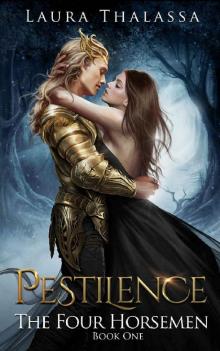 Pestilence (The Four Horsemen Book 1)
Pestilence (The Four Horsemen Book 1) War (The Four Horsemen Book 2)
War (The Four Horsemen Book 2)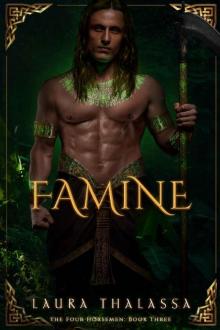 Famine (The Four Horsemen Book 3)
Famine (The Four Horsemen Book 3) The Queen of Traitors (The Fallen World Book 2)
The Queen of Traitors (The Fallen World Book 2) The Unearthly (The Unearthly Series)
The Unearthly (The Unearthly Series) The Damned (The Unearthly Book 5)
The Damned (The Unearthly Book 5) The Coveted (The Unearthly #2)
The Coveted (The Unearthly #2) The Vanishing Girl
The Vanishing Girl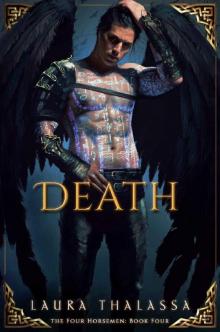 Death (The Four Horsemen Book 4)
Death (The Four Horsemen Book 4)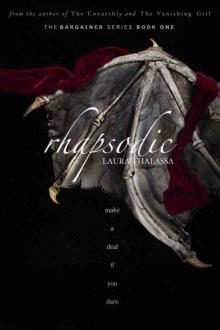 Rhapsodic (The Bargainer Book 1)
Rhapsodic (The Bargainer Book 1)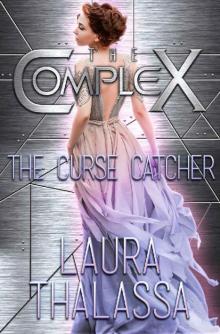 The Curse Catcher (The Complex Book 0)
The Curse Catcher (The Complex Book 0)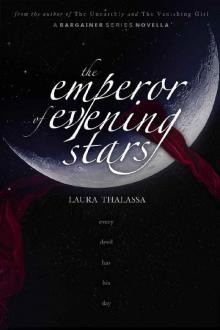 The Emperor of Evening Stars (The Bargainer Book 3)
The Emperor of Evening Stars (The Bargainer Book 3)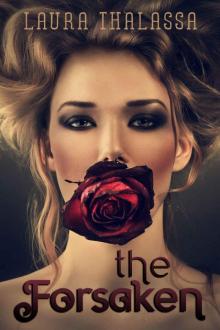 The Forsaken
The Forsaken The Queen of All that Dies (The Fallen World Book 1)
The Queen of All that Dies (The Fallen World Book 1)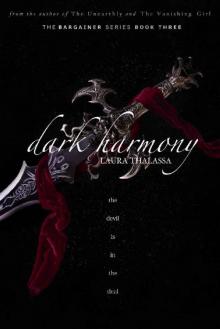 Dark Harmony (The Bargainer Book 3)
Dark Harmony (The Bargainer Book 3) Blood and Sin (The Infernari Book 1)
Blood and Sin (The Infernari Book 1)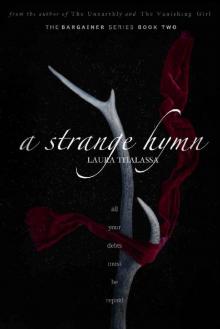 A Strange Hymn (The Bargainer Book 2)
A Strange Hymn (The Bargainer Book 2)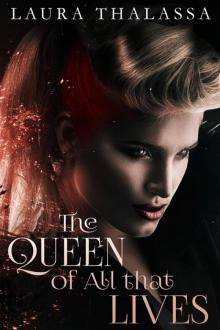 The Queen of All That Lives (The Fallen World Book 3)
The Queen of All That Lives (The Fallen World Book 3) The Cursed (The Unearthly)
The Cursed (The Unearthly)